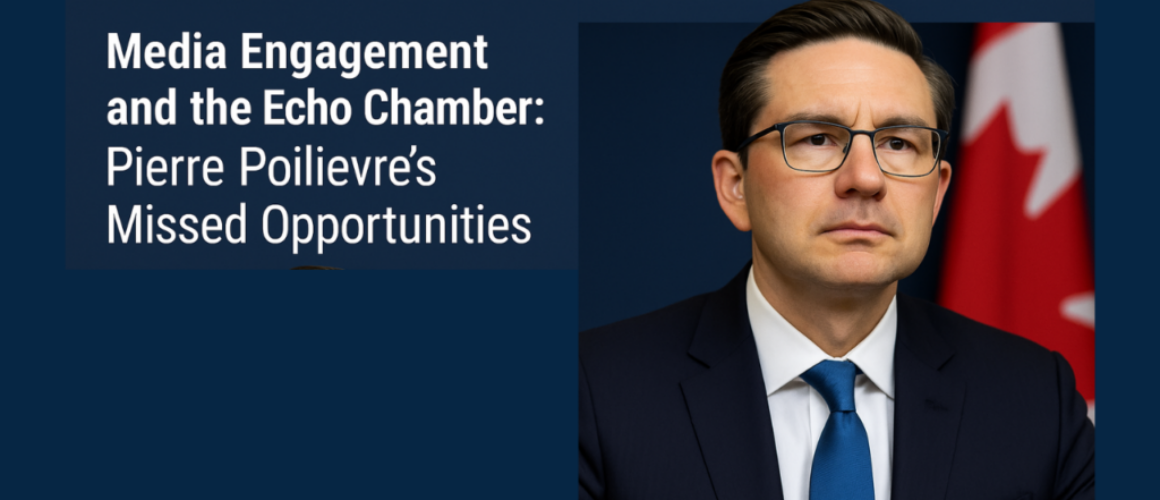Media Engagement and the Echo Chamber: Pierre Poilievre’s Missed Opportunities
Toronto, ON – In today’s hyper-connected world, political success isn’t just won on the campaign trail—it’s often earned in front of a camera, on a podcast, or in viral clips shared across social media. While Pierre Poilievre mastered digital media during his rise to Conservative leadership, his 2025 federal campaign exposed critical weaknesses in broader media engagement.
Chief among them: his decision to reject appearances on high-profile, alternative media platforms, most notably the Joe Rogan Experience, one of the largest and most influential podcasts in the world. This, combined with his limited access to major Canadian legacy outlets, created a campaign perceived by many as speaking to the base—but not growing beyond it.
The Digital Strategist Who Forgot to Evolve
Poilievre’s digital dominance was once envied across the political spectrum. His YouTube videos, direct-to-camera monologues, and viral tweets allowed him to build a loyal following of millions. For a time, he was the most-watched Canadian politician on social media, consistently outperforming Trudeau, Singh, and even Carney.
However, as the 2025 election neared, that approach began to stall. His content remained tightly controlled, overly rehearsed, and largely confined to platforms that already catered to Conservative audiences.
While Liberal leader Mark Carney gave frequent interviews with traditional outlets like CBC and The Globe and Mail, as well as long-form discussions with economists and climate experts on Substack and LinkedIn podcasts, Poilievre remained largely within his digital fortress.
The Rogan Rebuff: A Cultural Misstep?
In March 2025, Joe Rogan publicly revealed that he had invited Pierre Poilievre to appear on his podcast—a move that could have introduced Poilievre to a global audience of 11+ million listeners, many of whom are politically diverse, skeptical of mainstream narratives, and open to outsider views.
Poilievre’s team declined.
Rogan, never one to shy away from ridicule, went on to mock the decision in an episode:
“You want to lead Canada and you’re scared of a conversation? Maybe you’re not the guy.”
The clip went viral in Canada, drawing over 4 million views in under 72 hours. While Poilievre’s supporters dismissed it, undecided voters began questioning whether the candidate was truly comfortable outside his ideological bubble.
Media Isolation and Narrative Control
Poilievre’s rejection of mainstream media stems from a long-standing belief that Canadian journalism, particularly public broadcasters, are biased against Conservatives. In fact, defunding the CBC was a key plank of his leadership campaign.
But during a general election, narrative control is only as strong as your ability to shape public conversation. By avoiding neutral or adversarial spaces, Poilievre limited his chance to debunk myths, clarify his platform, and humanize himself to voters outside the Conservative core.
This self-imposed isolation became more obvious as Liberal leader Mark Carney gained traction with daily interviews, podcast appearances, and town hall-style forums that attracted cross-partisan interest.
Missed Demographics, Missed Votes
Poilievre’s media strategy may have solidified his base, but it failed to reach two critical demographics:
-
Millennials and Gen Z voters—who are more likely to consume politics via streaming, podcasts, and independent news
-
Soft centrist voters—who wanted a moderate voice with clear economic solutions, not just anti-Trudeau rhetoric
By not evolving beyond platformed talking points and YouTube rants, Poilievre unintentionally ceded the middle ground to Carney, who offered long-form clarity and calm professionalism—a stark contrast to the “attack dog” image Poilievre had cultivated.
Lessons for the Next Election
For Conservatives, this experience underscores a key lesson: winning elections requires more than digital reach. It demands media flexibility, message discipline, and risk-taking outside ideological comfort zones.
Poilievre’s command of short-form content may have worked in leadership contests and opposition debates, but a general election requires something more: presence, vulnerability, and open dialogue.
Until the Conservative Party embraces that shift, it may continue to win the internet—while losing the country.
